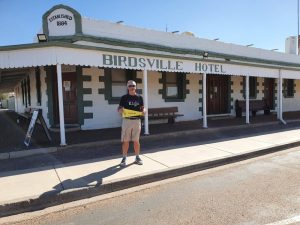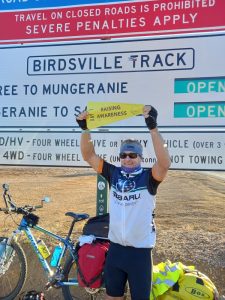
DAY 1 Raising Awareness
Such a taboo subject, even when people read the words ‘sexual abuse’ they feel extremely uncomfortable. But there are too many victims out there not to continue raising awareness. The Royal Commission into Institutional Responses to Child Sexual Abuse here in Australia has made an everlasting effect but we must continue the conversation no matter how hard it may be. YOU ARE NOT ALONE.
I have shared my story and with my adventuring and trekking, I will continue to talk and fundraise for Bravehearts because as a survivor I know how very much alone you can feel. I want other survivors to know they are not alone and they can build strength by reaching out for help and maybe one day share their story.
It shouldn’t be awkward for a survivor to share their story, it should be awkward for the abuser. Keep the conversation going, it empowers children and adult survivors to find their voice.
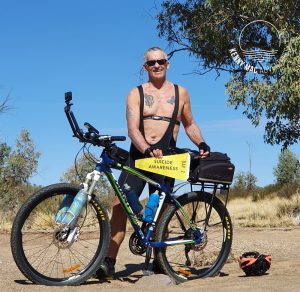
DAY 2 Suicide Awareness
The word suicidal to me means that it’s a long-term planned action – I was not suicidal.
For me it was a decision I made at the very last abuse act – I am not doing this anymore. It was a ‘Fuck this’ moment when I decided that I wasn’t putting up with it anymore, I asked for help, no one was believing me, I tried running away and I decided to commit suicide. It was a peaceful decision for me.
It was the trigger of me looking at myself in the shower, I was not suicidal before that moment. It was at that very moment that helped me make my decision.
Suicide is not something many people talk about – when people talk to me about the book it is not something that they ask questions about – or bring up in conversation. It is not spoken about why I decided to commit suicide or the fact that I survived the Suicide attempt.
Angela (my youngest daughter) asked me why I gave up? She has only ever known me as the dad who would never give up – in all the events and training I have done – I have never given up. Angela is really the only person who has asked me questions about the suicide.
In my book ‘No Defence’ it explains about that night I made an attempt on my life. That last night of abuse was the trigger. I was never suicidal, I just couldn’t get the Naval MO to believe me.
Please understand that families of suicide victims may never know why.
I think this is the scariest part for most people – to talk or to ask about suicide.
It is important to talk about it – I read a lot of articles on this subject. It’s sad, just plain sad.
I have read somewhere that ‘No one commits suicide because they want to die. They do it because they want to stop the pain”. I think that this is an important part to remember.
The rates of Australian Veterans that are committing suicide was roughly four times the general population rate but has now risen. The figures for sexual abuse survivors who commit suicide is not really known.
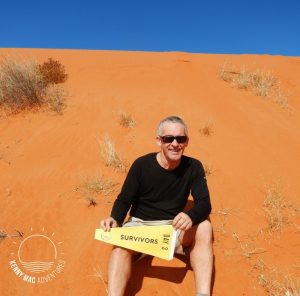
DAY 3 Survivors
I am a Survivor of childhood physical abuse, sexual abuse and a suicide attempt.
A Survivor – is someone who has gotten through the trauma – and is still alive. Luckily, they did not die from the suicide attempt or were not killed during the trauma.
These survivors can be at all different levels of their journey. Some survivors are just starting their healing, some are progressing and some are further along the way.
We are all at different stages.
I use the word Trauma, rather than physical, mental, sexual abuse.
Being a survivor doesn’t mean that you are coping or that you are always okay. Some Survivors are still not coping.
At the National Apology in Canberra , I sat amongst hundreds of Sexual Abuse Survivors and I saw so many broken people. People who are still not coping, and who are absolutely wrecked. I think to myself that was 800 out of 8000 from the Royal Commission – they are all Survivors, but what’s left of them. This is why I say no Survivor is the same.
No Survivor is the same.
I use the word survivor, a word that sounds stronger than a victim. In the mental health arena when you have suffered a trauma of any form it gives the individual an entity that is not one of shame. It is a strong word to describe these people rather than the word Victim.
They used to use the word Survivor in the wars but not in mental health. In mental health, victims suffered trauma. It’s hard for some people to link the words victim and survivor. The victim and the survivor are the same person.
A survivor of trauma.
Trauma can be accumulative, this is something that we sometimes forget. So trauma can occur, then another, one thing will tip the person over the edge then the curve continues.
We shouldn’t use the word victim because, a police officer can have trauma but he may not be a victim. Same as an ambulance officer. I am a victim of sexual abuse.
Each person has their own story, but we are all survivors of trauma.
Why is today so important riding for survivors?
I do what I do. I will continue sharing my story and raising awareness that you out there are not alone. If it can empower one person to speak up and make a difference, that’s bloody terrific.
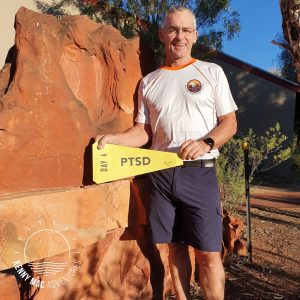
DAY 4 PTSD
It is my understanding that PTSD occurs when you experience too much stress from a past trauma. Something may trigger this PTSD in a current situation, even though the original danger has passed. It is like your nervous system is ‘stuck’ it is unable to return to its normal state of balance and it is unable to move on from this event.
I still have intrusive memories, flashbacks, nightmares, mental or physical reactions and these make it difficult for me to regain my sense of safety, trust and self-worth.
I find exercise my rescuer – I always get asked why all the rides and runs and my epic adventures instead of relaxing on resort holidays. I also get asked what drives me to be able to push myself to extremes on my adventures.
Exercise enhances my mood and it gives me a bucket load of endorphins, it actually helps me and my nervous system to become ‘unstuck’. And the extra benefits of eating healthy and regular exercise is certainly good for my body and mind.
I sometimes go too far with my exercise – it becomes ‘obsessive behaviour’ and this is when my family or my therapist steps in and points it out to me. When this happens I try to slow down a bit.
Heading into the outback for me is like checking into the outback rehab – a treatment for my mental well-being.
There is no right way – there is no set formula.
I am not PTSD – I live with it, it’s like my housemate – Alanna (my eldest daughter) calls it Peter. There are times where my housemate is really loud and takes up every room of the house and there are many other times when it’s not at home, it’s just me.
I still struggle on days and I don’t always get it right, but I’ll never give up. I have many days when I am not okay!!! I make sure that I am getting the help and support I need through my psychologist and psychiatrist.
I am not sharing my story and raising awareness because I am healed. It is difficult, it heightens my PTSD, it brings with it triggers, sleepless nights, night sweats, anxieties, I relive the trauma by sharing.
But I will continue to do this, to raise awareness and to continue the conversation. This is so important!!
No Survivor should feel alone – You are not alone!!!
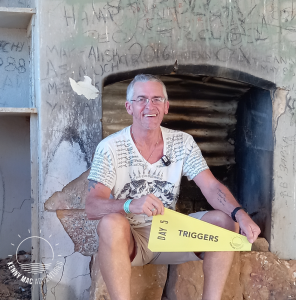
DAY 5 Triggers
“When someone’s PTSD gets triggered, they often experience physical reactions, such as difficulty breathing, pounding heart and heightened startle reflex. This can be attributed to increased levels of adrenaline.”
“These floods of adrenaline arise because brain circuits involved in the regulation of emotion learn to activate in response to trauma-related cues and then do not unlearn these associations after the threat passes,” explains Dr John Krystal, a national PTSD expert and chief psychiatrist at Yale Medicine.
“In other words, any time people with PTSD get triggered, their bodies may react the same way they did during their trauma. They can get stuck in their fear.”
That note from Dr John Krystal explains Triggers very well psychologically.
Triggers often include smells, touch, words, sounds, questions, sights or thoughts that remind you of the trauma in some way. These are talked about in my book, ‘No Defence’ as well as how professional help can desensitize the triggers. I was able to do this with the help of a psychologist during my monthly meetings over 7 years. I still, to this day regularly see a psychologist.
Dreams or Nightmares, this is my subconscious trigger of which is a little harder to control. If I wake up in an agitated state and in sweats, I will get up read my left arm mantra tattoo, “A different Time, A different Place, I’m Safe Now”, change my bedding and pj’s and back to bed (that is, if it is not too early to go exercising).
I must confess I have at times gone off cycling at 2:00 am for 4 to 5 hours because I couldn’t face lying back down trying to sleep in the fear that the nightmare would continue. I am getting better at going back to sleep with my mantra taking care of me.
Why the tattoo? The story goes like this. I did have it on a piece of paper, but mostly couldn’t find where I put it when I needed it, like out somewhere with friends. I had a bright idea, put a picture of it on my phone, then I couldn’t find which album I put it in. Hence the tattoo, now I can just drop my head a little and read it and not be noticed by anyone. It really is my saviour.
Triggers and PTSD are a bloody pain in the butt, and I often wished I didn’t have it.
My unfriendly word, CLOSURE.
How do you obtain closure, there has been no closure in receiving an apology from the Defence Force, I still have lots of triggers.
I honestly believe there is no such thing as CLOSURE. There’s better, there’s different, there’s lots of other words but there is never closure. Closure means done. Hell, it’s never done. It’s never going to be done. It’s just a fancy word clinicians and people who have never known trauma like to use.
I will never have closure, but I will have strategies that help me carry on.
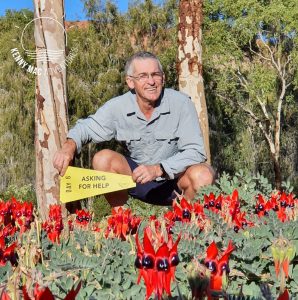
DAY 6 Asking for Help
It is all well and good getting help and having access to help, but it is also important to get the right help.
The struggles that Survivors have when reaching out for help and then having to report is quite daunting. Disclosure can be a scary and difficult process, it was for me.
If I could share one thing with other adult survivors of childhood sexual abuse, it would be that they need to allow themselves some freedom to take care of themselves. Get help from a professional, find out what works for them and allow themselves the time they need before fighting that fight within.
There is no right way – there is no set formula.
It is really important to include professional help, either Psychologist or Psychiatrist or both. To this day I still regularly see my professional mental health team and they help me live with PTSD.
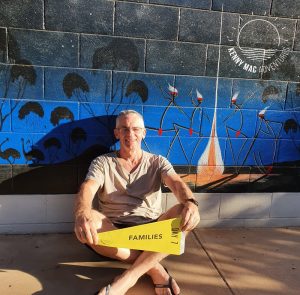
DAY 7 Families
Why is the topic ‘Families’ on the last day?
The family part of my wellbeing has been so important. And, yes, I understand there are victims that are not able to share this because of certain circumstances. For example, the abuser is a family member.
The reason it was really important for my family to know was twofold. Firstly, they understand a little more the way I react to certain things and secondly, I get so much love and support to help me navigate my journey through days when it’s really tough.
Not many people know the affect it has on families. Coping with the many challenges of living with a loved one with PTSD is not that easy.
I am lucky that I have a spouse and daughters who understand, well they get it, that I go off for days and weeks on epic treks.
Families need help too, it is not just the Survivor who needs to ask for help and get support.
Families need help too!!!
I want to finish by saying, I love my family. Pam and my four girls, now ladies; Alanna, Emily, Elysse and Angela.

